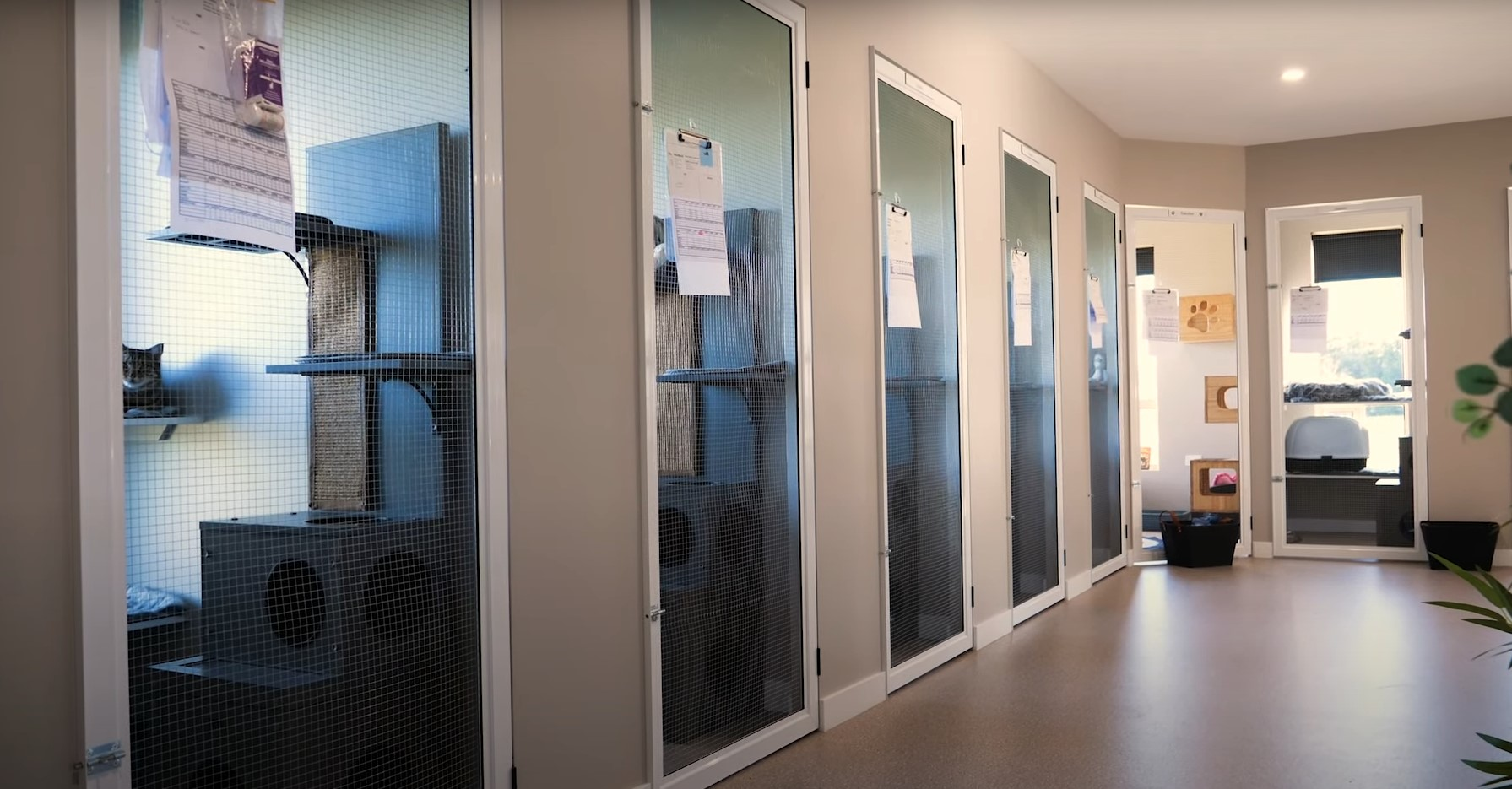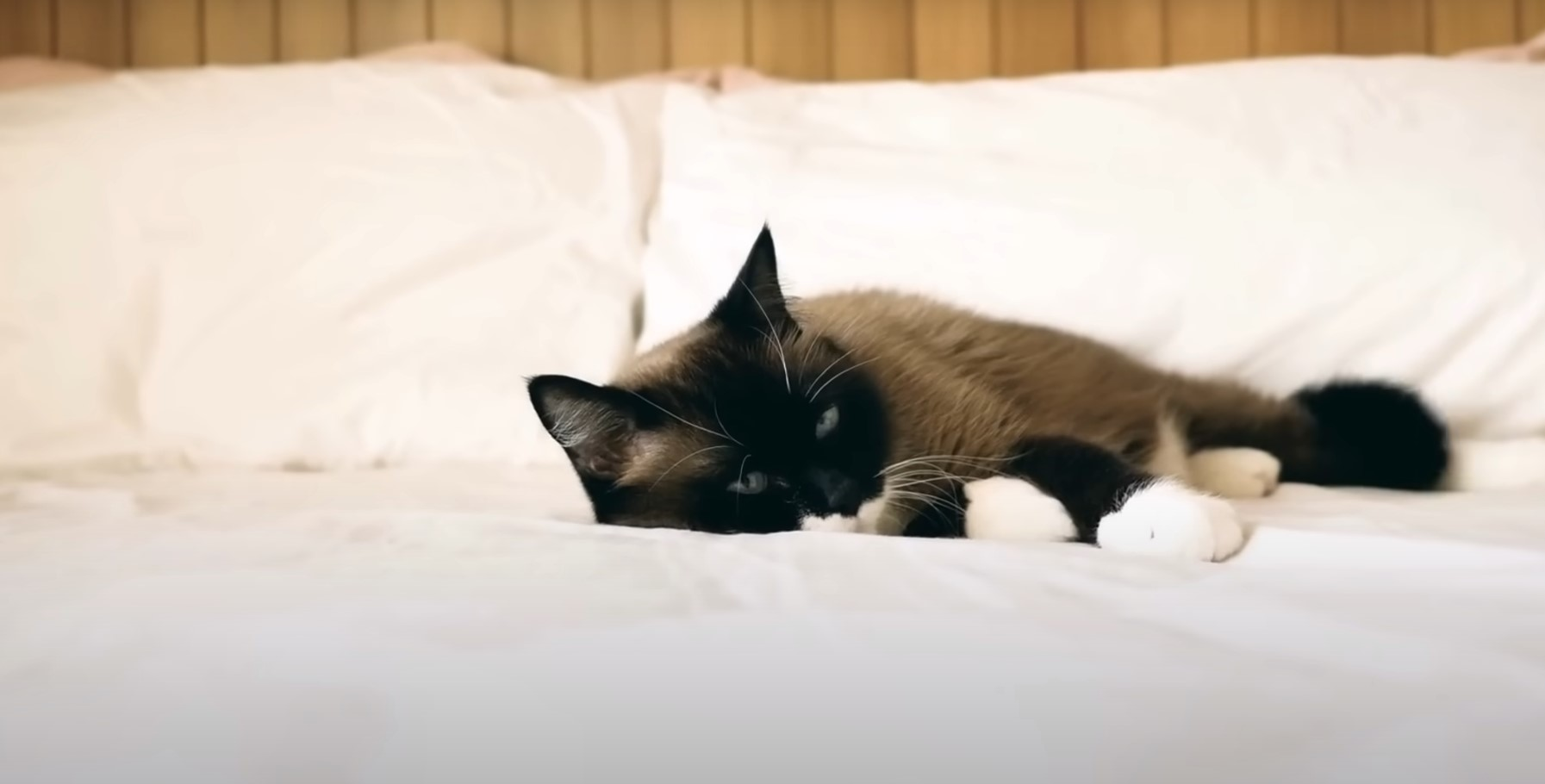When you own a cat, going on holiday or away for business requires additional thought. Where will the cat go when you aren’t there to care for it? For some people, there is an easy answer to this question – a trusted friend or family member can care for the cat in your absence.
But what if no friends or family can look after your pet? This is when you must look at other options, like hiring a cat sitter or booking your cat into a boarding facility. However, choosing between these two possibilities can be challenging if you aren’t knowledgeable about them. Thankfully, this article aims to decide which is best, a cattery or cat sitter.
Table of Contents
What is the Difference Between Catteries and Cat Sitters?
Simply put, the difference between cat boarding facilities and cat sitters is one allows the cat to stay at home, while the other requires the cat to be transported to unfamiliar surroundings. The cat’s personality, confidence levels, and experience outside the home will significantly influence the choice of care option.
What is a Cattery?
A cattery, also known as a cat hotel or cat kennel, consists of multiple temporary housing units for cats. This type of accommodation is commonly used by pet owners who cannot keep their cats at home for a short period, such as when they go on holiday or decorate their homes. Each unit in a cattery will include a sleeping area and an exercise run for one cat or several cats from the same household.
According to The Animal Welfare (Licensing of Activities Involving Animals) (England) Regulations 2018, individual units should have enough room for the cat to “walk, turn around, stand on its hind legs, hold its tail erect, climb, rest on the elevated areas, and lie down fully stretched out.” The Animal Welfare Act also sets out further guidelines for catteries, such as the spacing between each cat unit, the monitoring of cats, and the recording of all cats on the premises.
Most catteries are professionally run facilities offering round-the-clock care for all varieties of cats.

What is a Cat Sitter?
A cat sitter is a person who comes to the cat owner’s home to care for the pet during the owner’s absence. This person might conduct several visits per day to ensure the cat is properly cared for, or, in some cases, they will stay in the house to perform the duties of a house sitter, too. Before hiring the cat sitter, the tasks they are expected to complete should be discussed.
The care will take place in the cat’s home, which can help make the cat feel more at ease when the cat owner is away. Cat owners can discuss with pet sitters how to personalise the daily drop-ins to suit their cats’ routines, such as when to offer food, how long to play, and if grooming is required.
Benefits of Using a Cattery
There are some benefits of using a cat cattery instead of a pet sitter, as shown below:
Catteries Must Follow Strict Regulations
As previously mentioned, The Animal Welfare Act outlines how catteries must conduct business to protect the health and safety of animals in their care. This ensures that any reputable catteries will be licensed and meet the professional standards required; cat boarding facilities rely on good reviews, so they should follow the guidance stated by the government.
Catteries that follow government rules on providing boarding for cats must provide each cat with a litter tray, which is regularly cleaned, scratching facilities, and enrichment with toys and feeding. Between uses by different cats, the units must be disinfected.
There is More Supervision
Unlike a cat sitter who only visits for short periods throughout the day, catteries can offer near-constant supervision. Many boarding facilities have cameras to monitor the pets being cared for, and staff members will be on duty most of the day; in some catteries, staff members are on shift 24/7 to provide care. This ensures cat owners have peace of mind when they have left their pets in reputable boarding facilities.
Additionally, if your cat is kept at home but still has outdoor access, there is no guarantee your cat will be home when the pet sitter visits. Cats can be quite unpredictable, especially when their daily routine has been changed, and they might run out of the cat flap at the sight of a stranger in their home.
No Strangers in the House
Some people are uncomfortable letting strangers inside their homes when they are not there, so cat sitters might not be the best choice. This is a common issue for cat owners when they go on holiday, as they do not want to risk their homes in any way. Thankfully, keeping a cat in a cattery means no one has to enter your house to care for the cat; the cat is taken to the facility and cared for there.
Some Catteries Offer Home Boarding
If your cat is unsettled in a standard cat boarding unit, some facilities will offer boarding in the owner’s house instead of keeping the cat in its own enclosure. This can be ideal for nervous, senior, or young cats; these cats can be overly sensitive to changes and the environment they’re living in, so a calmer household setting is better suited to them.
The cattery might discuss this option with you when booking your cat in, or they might contact you during your cat’s stay to verify you agree to a change in accommodation. This might also increase the cattery cost, however.
Benefits of Using a Cat Sitter
If you are a pet owner, it is essential to understand the benefits of choosing a cat sitter over a cattery, which include:
Keeps the Cat in Familiar Surroundings
Though anxious cats benefit most from sticking to their usual routine if kept in their own home, most cats can become stressed if their schedule changes. Cats are creatures of habit and are very fond of their territory. If the cat is kept at home with a cat sitter dropping in to visit, this will also avoid the need to transport the cat from home to the cat boarding.

Even though professional catteries follow rules to prevent the spread of disease on the premises, keeping the cat in its own home environment reduces the risk of catching cat flu or another infection. Older cats and kittens are most vulnerable to cat flu, which has symptoms similar to human flu – coughing, fever, lethargy, sneezing, and runny eyes and noses.
Behavioural issues may be avoided if the cat is also kept to a regular schedule in familiar surroundings. Many cats can become destructive when they are stressed, scratching furniture and yowling loudly for attention. By keeping the cat at home, this unpleasant behaviour can be prevented.
There are No Strange Cats
Apart from the cat having to deal with the pet sitter coming into its home, there is very little extra stress as there are no unfamiliar cats to smell or listen to. Some cats find the cattery environment can cause sensory overload due to the onslaught of scents, noises, and sights, even more so if they are from a single-cat household.
The individual units in catteries should have gaps between each one to keep cats away from each other and provide cats with covered areas to hide in if they want to. However, this might still be too much for cats with shy natures.
Other Duties Could Be Carried Out
As well as caring for your furry friend, many cat sitters offer additional services like house sitting or taking care of other small pets. If you are away for an extended period of time, a cat sitter that can complete various tasks around the whole household is beneficial.
This, on top of the cat sitting services, will increase the price, though. For example, some cat sitters that agree to overnight stays double their cat sitting costs. Before hiring a specific cat sitter, you should discuss your needs to ensure the correct pricing is given and all expected tasks are carried out. In some cases, administering medication will increase the cost, or the cat sitter might be unable to do this, so you would want to hire a different pet sitter.
Usually Cheaper Than Boarding Facilities
Although additional services sometimes increase the amount cat sitters charge, they can still be less expensive than some cat boarding facilities. Many cat sitters are freelancers who can set their own pricing in line with others in their area. Without the need to worry about utilities, food, cat litter, and other essentials, cat sitters can be cheaper.
To Sum Up
Owners must look at their cat’s behaviour and personality to understand which option they prefer. Many cats with apprehensive natures will prefer to stay where they are comfortable, meaning a cat sitter would be the best option. However, this will depend on the cat’s personality; a more outgoing cat will be less likely to get stressed if kept in a cat boarding facility than a timid cat.
As well as analysing their cats’ requirements, cat owners should also determine what they are comfortable with when deciding who can care for their pets and maybe even enter their homes. If the idea of someone new entering your house is unsettling, booking your cat in a cattery could be the preferred choice.
Both catteries and cat sitters have benefits to using their services as long as professional, experienced carers are selected. Either way, you can have peace of mind knowing your feline friend is cared for when you next leave on a business trip or holiday.

